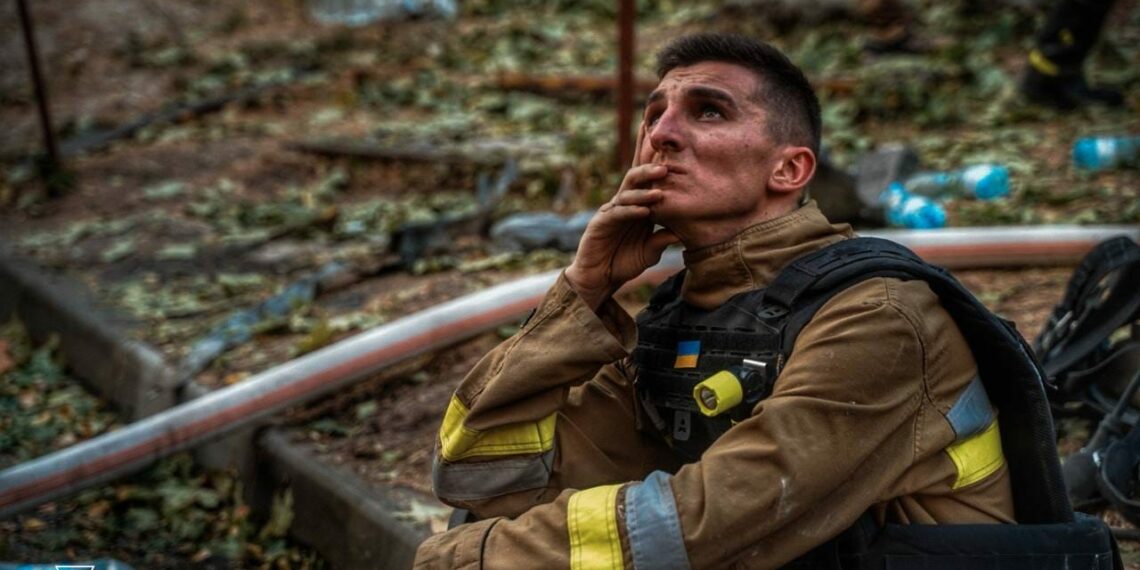The new academic year has just started, and we continue our polemics on the full-scale war. Today, the 936th day of full-scale war. We are worried and go to study, we feel anxiety and try to support our relatives, we are woken by sirens at night but in the morning we go to work and donate our army, we choke with anger, but we live and survive and hope to win. Today we talk about stress, anxiety and depressive thoughts, we talk about the way of overcoming and coping with it.
Liza Kozlovets:
It is impossible to avoid stress living in Ukraine right now. Though, it is impossible to live in constant anxiety, as well. And so, my main advice to survive in such circumstances is to maintain aware of your own goals. For example, when I get too depressed about some tests or unsuccessful applications and then remember about possibility of being struck with a missile – what a life! – I also remember about all the things I want to accomplish in my life. I want to create and analyse contemporary Ukrainian literature. And manage cultural processes in my country, so that the next generation won’t feel lack of it never again. When you think about the bigger picture, many issues may become solvable. So, my advice is not to forget your aim.
Anna Haidai:
Changing the mindset has become the most productive tool to cope with stress, anxiety and sleepless nights for me. Facing up with the destruction of people who keep deeply in my heart has made me aware of the strongest thought of my life. It was the moment when I realized the absence of even a small chance to get weak. I named it ‘to grow up’.
My father is in the military. Such a decision has been completely clear for him since the war has started. He wanted to take part of. It isn’t a case when the law pushes you. He has survived a stroke and can be demobilized. But such a story isn’t about him. Does the understanding that your dad can die in every moment make me frightened? Sure. Deeply frightened. As much as the young, defenseless girl can feel.
But it is also worth highlighting that there is an even more defenseless girl in my family – my mother. And there aren’t any words which can describe her destruction. She is like a stone without emotions, like a volcano which won’t stop erupting, like a dried up flower. She is a woman who doesn’t see the future. Woman who needs to accept that the man of her life desired to join the army and didn’t desire to be near her.
And every time she asks me ‘Why isn’t he with me?’ or ‘How can I live without him?’, every time I wipe her tears and persuade that life hasn’t stopped, I feel that something childish is dying inside. I will never be little Any. And I have no chance to get weak. Who, if not I will help her to overcome the war?
There is one fundamental point in life when you become guardian of your parents’ peace. And if you got to this point, you would never come back. That is about the strength, which doesn’t admit you to be stressed or anxious. Keeping calm. Just keeping calm.
Sasha Ferenets:
Those have always been a big problem for me, and I’ve tried many things to ease them. At some point, I was even made to believe that my nervousness in stressful situations makes me a weaker person. What a joke! Now I see my anxiety as a completely normal part of me, such as a crooked tooth in my mouth, or a pimple on my forehead.
So far, the only thing that helps me cope with stress is people. People that freak out with you, cry with you, laugh with you… As long as I am not alone in my anxiety, it cannot take over me. It cannot hurt me. It fears my friends’ voices, it hides from their breath, it calms with their smile. And those moments of nervousness with them become great treasures of mine.
Veronika Martynova:
I cannot completely overcome stress. The methods I mostly resort to are wrong: eating sweets, watching short videos with funny animals, avoiding conversations that emotionally drain me. So instead of eradicating stress, I got used to it. I have adapted to sleepless nights: during air raids, when it is simply impossible to fall asleep, I read a book, do work or study. This doesn’t reduce the level of overall tension and anxiety, but it at least helps to distract myself.
Of course, not everything is so bad and hopeless. The fact that I keep moving forward means that I will live to see the moment when this monochrome scenery disappears from my life. I’m inspired by the people around me, by walking around the city, by my desire to become a historian. Even when stress is unavoidable, you just need to make it the background of your bright, promising life so that the percentage of positive emotions is higher than the share of negative ones.
Finally, I recalled lines from a song by Patti Smith, a very important person to me: “So throw off your stupid cloak. Embrace all that you fear. For joy shall conquer all despair…” And I believe in these word very much.
Marusya Shcherbina:
Stress has become our daily routine. Every single day, we need to accept challenges and overcome them. In this circle of problems and solutions, it is extremely important to find our ways how to manage the amount of stress and avoid serious mental and physical issues. For me personally, there are several possible ways that are helpful in different situations. One of my favourite solutions against stress is physical activities. I like dancing a lot, and this particular activity helps me to recover from the most stressful moments in everyday life. Another thing that contributes to my well-being is time spent in the nature. This connection always makes me feel better and gives food for positive thoughts. I also feel inspired after going for a walk or spending some time on fresh air, which is even better with an interesting book. Last but definitely not least is an opportunity to help others to reduce the amount of stress. I usually feel much better after taking part in something important that could help other people. Initiatives such as charity activities or donations are beneficial not only for society, but also for my mental health.
Oleksandr Kravchenko:
One of the biggest things for me has been talking to people I trust. Whether it’s a close friend or a family member, just letting out what I’m feeling often makes things more bearable. There’s something about sharing your thoughts with someone who understands that makes the burden feel lighter. I also remind myself that I don’t have to have all the answers right away – it’s okay to just take things one step at a time.
When I can’t sleep or feel overwhelmed, I try to focus on the small things I can control. I’ll make a list of tasks, even if they’re simple things like organizing my desk or making a cup of tea. Accomplishing those little tasks gives me a sense of control when everything else feels chaotic.
Sofia Kovernyk:
For me, the best way to deal with anxiety is to stick to a daily routine (for example: do exercises every morning, read a book before bed, etc.). This advice kept me from going insane in the first months of a full-scale war, and helps me now to avoid a nervous breakdown due to massive missile attacks.
Maria Klitynska:
It is difficult to answer these questions immediately because it is always a combination of a whole series of circumstances. The first thing that came to my mind was support. And here we are talking not only about the support of one specific close person (friend or mother), but about an entire nation. The entire society is under huge stress, all the residents of Kyiv (and often not only them, it can be a resident of any city) together with you stayed up all night because of shelling and in the morning will be angry and exhausted like you, but you will find the strength to smile at each other in the lift and make this day at least a little better. The second is acceptance of pain and negative emotions. It is impossible to escape from them, they will always catch up with you, so you should accept them because, let’s be honest, sometimes it is simply impossible to cope with everything that happens. But still, in order not to get stuck in this pain, it is worth focusing on positive moments and these can be small things. You managed to pass this assignment on time, you woke up and had a delicious breakfast, you made a donation and this is enough to function further. Moving on to more practical moments, sports, and sleep help a lot. I chose stretching as a sport for myself. It helps to relax and stretch the whole body, reduce stress, and, at least for an hour a day, to abstract from all events and be with yourself. As for sleep, if I didn’t sleep at night because of the explosions, I should get some sleep during the day because sleep is the key to reducing anxiety. But I’ll be honest with you, none of this can take away all the tension and anxiety that one has to live with during a war. And I still don’t know if I will be able to fully recover even after we win.
Denis Popov:
it might sound a little bit funny, but food has been one of the best “pills” from stress and anxiety. Especially, during the first weeks of the war, when my family and I were sitting in our granny’s corridor most of the time, my grandmother would cook us meals. They were simple, but tasted like the most delicious food on Earth and made me forget about any troubles or stress I was having while eating. Maybe that’s because any of these meals could have been our last… Anyway, still I find food the best way to cure stress and forget about anxiety, and, at the end of a day, it might be the most pleasant way to erase any bad feelings!
Veronika Shevych:
Many people call romantic comedies a waste of paper or a silly reading for mothers who are looking after their offspring or old ladies who live in their cottages in the villages and have a lot of free time. I have nothing against mothers or grandmothers, however, it is more than just a way to pass the time – these simple plots and surreal positivity helped me survive the war and not go nuts. I read romantic books from the first days, in the basement I was distracted by the story of Scarlett O’Hara, even now when I come home to Sumy, where you can hear several explosions per each day, I read several romantic comedies (for example, Beach Read or Better than the Movies ) to calm myself down and sleep better. Such simple stories without too deep meaning and great emotional load help to forget yourself and relieve anxiety, which is why I consider them my best sedative.
Sofyia Holovko:
For me, the best way to cope with stress is to go through it, to let myself feel pain and anxiety, not to avoid or prohibit them. At the same time, it is important not to miss a moment when it’s time to pull myself out because if stay there for too long you might stick. Another thing is to talk. Whether with friends, partner, family, or therapist – when we talk things through they become understandable and concrete. And therefore easier to overcome. If there is no one to talk to – then sit and write. Write down every thought and every feeling that appears in your head without analysing or overthinking. Just letting be.
Yelyzaveta Shramko:
It’s hard for me to say whether I really cope or just pretend to, since there are many things in front of which I still feel very vulnerable. My hometown has been attacked by drones rather often this summer, and while I was there, almost every night felt like a nightmare. The explosions there seemed louder than the ones I heard from my dorm in Kyiv. It felt like they were right above my head. Until the end of my summer break, I’ve grown afraid of silence and the sound of the wind outside. I had problems with sleep and was on edge every night, monitoring the news. Each time I heard explosions, I asked myself why couldn’t I stop feeling this stress and grow accustomed to it. There was no answer. That desperate feeling hadn’t left me until I finally came back to Kyiv.
The only thing I’ve learned to cope with is the reality we live in. Once I finally understood that our world has always been rather unfair and people tend to be indifferent to the concerns of the others, once I distanced myself from that feeling of sorrow, I finally felt free. Now I’m perfectly fine with the fact that most people outside of Ukraine don’t care about our war and that many Ukrainians are indifferent to our language, culture and history, too. Not that I approve of such views and behaviour, but I don’t feel as vulnerable to them at least. I’ve learned not to put my hopes too high, and that helps me. Though, sometimes all of us come across the people who seem good when, in reality, they’re not. The ones who are supposed to be empathetic to our tragedy, appear to be apathetic. And that surely hurts. But dealing with the pain of unfairness is our only way to survive this war. So, I have to overcome it every time. And, probably, this is my way of coping. It’s not always perfectly effective, and it can’t protect me from the stress of the missile attacks, but at least I manage to go through this and not feel as ruined as some people around me.
Sophia Chornopolska:
I believe that anxiety and stress are a bit more deep-rooted feelings than it seems at first. What is so scary about failing a test? A bad mark or, maybe, the feeling of being a disappointment? When I get stressed about education, I try to slow down and remind myself of the reason I am here in the first place. I have priorities in life, and they are what really matters: it’s art, love, friendship. Will my creative skills worsen if I don’t find enough time to read a book until the exam? No, I will only obtain a new experience. Talking to people who value me as a person is also a good idea. I am lovable and important regardless of my current studying situation. There are ups and downs for every person, and I’m truly grateful to have people in my life who would support me through it all. Moreover, I have some philosophical views on worrying. The Universe is constantly widening with unequal acceleration, time passes, and perhaps there is nothing truly eternal. So, is the short-lasting worry about a grade really worth this much drama? I just have to do what’s in my power. Realizing that there are things I can actually control instead of replaying all the possible outcomes is calming, too. However, sleepless nights do bother me. It’s a little challenging to combine both artistic expression and studying, considering that the first matter always requires the absolute maximum of internal resources for me. And then, there are air raid alerts. As a result, I have a pretty bad sleeping schedule, which really should be changed. However, education doesn’t stress me out as much as it used to, and I believe it to be a great achievement.
Lilia Chernyshenko:
Usually, I overcome anxiety and stress by just “closing” my basic needs, like eating healthy (and enough), having a nap, doing sports or having a proper rest. Though it’s pretty basic, but it helps, as long as in stressful situations I tend to forget about taking care of myself. So, for me, the most helpful thing to overcome anxiety is just to slow down and pay attention to my current needs and wants.
Viktoria Romas:
In the first days of the invasion, I engaged in escapism, for example, constantly scrolling through TikTok. At that time, it was a “safe” place where all people shared their routine, emotions. In tik tok, people joked a lot about russian invaders, there were many funny memes, etc.
TilTok, instagram etc. gave a sense of hope and unity of the nation,
so I wasn’t so scared.
Now I don’t use my phone all the time. Books, music, friends, and family save me from stress.
Anastasiya Chepeleva:
The first air siren gave me a harmful clap to wake up and encounter reality. At first, it was horrible to grab the most necessary things and stand with my mum near the basement holding our hands. And the fact that you have somebody to hold hands with releases you for some seconds. The awful truth is that people always get used to new circumstances. So did l. But then it’s time your anxiety erupts – the best thing is to escape into your hobbies or things that help you to restore breathing. As for me, I try to concentrate on some texts with which I’m acquainted. Some book plots I knew so that I could move myself into a safe place in my head. Also, it’s nice to listen to the calm music, which is an absolute contradiction to the air siren that you were forced to listen to. Occasionally, you just need to keep in touch with somebody about whom you care just to know that they are safe and this can release your stress as well. It’s crucial after this explosion of anxiety to recharge your batteries and unwind after a horrible day or night.
Anna Bryndzia:
When it comes to anxiety, I don’t have a proper answer for dealing with it. I can’t do nothing about being nervous when I am put in situations that cause me to feel under pressure and for several years that I’ve been trying to figure out how to overcome such feeling I don’t have the right answer for myself yet. My body usually decides to overcome stress by “oversleeping” it, this way I unconsciously escape what bothers me by resting and just not having the chance to think about all that. But what I try to do to deal with stress and anxiety is to persuade myself that everything will be good at the end of it, I try to refocus myself on something that will take me into the other world by watching movies with fascinating plot etc. I really like to take care of my mental health by treating myself right so while having stressful times I may buy myself a little more than usual, and it is typically about sweet treats, favourite foods, drinks with my friends at our favourite coffee shops, new findings in thrift stores and just some silly little things that will make me feel happier. I also understand that I should experience my negative feelings without influence from outside, so I usually find a chance to find time to stay just by myself and minimise socialisation for a short period of time that I am struggling to overcome successfully.
Nastya Klymenko:
I know — when I hear air siren, you have to let yourself be afraid and don’t panic. You should let yourself feel any emotions you can, but at the same time not let these emotions go too far.
I know — when I hear the explosion I have to remind myself, where are my documents. I check them and then lay down to bed during the new missile strike — tomorrow I have an important exam. And an important event — we will fund some money for our military forces.
I know — when I hear an air siren I should remember — I live even though russians kill us every day. And I live for those, who died for my life — yesterday and today.
This thought is the only thing that helps me with anxiety when I hear another explosion behind my windows.
Sophia Samborska:
I treat my war experience like I treat ADHD. It may seem an odd comparison, but I try to survive in the ongoing war using a strict schedule, regular and exhausting cardio training, and non-stop self-reflection. I read that people with ADHD do the same to feel sane and control their lives. So I wake up at the same time every day, no matter what has happened, eat breakfast, run on the treadmill, study, and work as much as possible, trying to put on schedule every minute of my life. But there are days when it doesn’t work. Then the only thing I can do to survive is pretend that my life is a book or a movie. For example, I observe how me and my friends chat at the pub on a usual Friday evening during a massive missile attack and ask myself, “How would Hemingway write about that?”
Sofia Shelest:
Living during the war is living with the permanent danger of being hurt physically and mentally. It’s unreal to get used to this, but all of us try to adapt. Also, everyone has personal worries connected with studying, work, relationships and daily routine. There is days when I just can’t keep going with all my duties and studying because of another sleepless night caused by missile attack and news about how much people were killed by it and on the frontline. I allow myself to feel pain, rage and other emotions in such situations. My loved ones help me to overcome such state with words, hugs or always being there for me. There are more effective ways of coping with stress caused by daily routine. For example, I do sports or go for a walk because during such activities our organism produces serotonin, which helps us to calm down. Moreover, a tasty meal, favourite music or book can make my day better, at least for a while. When I stop believing in myself and scary that some mistake will ruin my life, my inner voice keeps saying to me that the result of any task doesn’t define me as a person, and I am always enough. Therefore, I try to always choose myself and adapt to the current life during the war.
Marya Shvets:
I am still learning how to deal with anxiety. For instance, yesterday I spent the best evening at my favourite music artist’s concert. Afterwards, I felt like I was on top of the world. It was so easy to breathe fully, without any fear. I felt cured of anxiety. Unfortunately, a couple of hours later, an air siren started, I heard explosions and already on my way to the bomb shelter, realised that the whole result of the concert, this feeling of peace, was gone. Instead, I once again gained heavy breathing.
Nevertheless, music is still usually my saviour. When anxiety knocks on the door, I plug in my headphones and turn on my best-loved songs. All of them are full of hope, and as one of our famous Ukrainian poetesses once wrote: «Only one hope is left». Hope is what helps me deal with everyday struggles. I need to hear someone say that I can do the task, or that I can say something without fear, or that I can survive another night under bombings. Sometimes it’s enough to hear such words from relatives or friends during my anxiety attacks, but the best way to overcome this stress is to dissolve in my favourite, hopeful, music.
Evelin Horban:
Since the war started, my tolerance for stress has diminished, so I had to introduce many small changes into my routine to accommodate this new life. For example, I started reading short plot summaries of books before actually starting them — the tension in some scenes would make me feel physically ill, so I wouldn’t be able to finish these books otherwise. Another thing that’s made a huge change in my life is music. My experience has proven that a good tune can make even the most stressful situations manageable. I would go as far as to say that listening to music is what prevented me from skipping class every time. I had anxiety attacks over “not being prepared enough”. And, of course, medication is necessary to keep a cool head during these trying times.
What I’ve learned over the last few years is that making even such small changes can improve anyone’s quality of life significantly. We shouldn’t dismiss them in favour of more traditional methods, but rather mix and match the things that work for us personally in order to live our lives to the fullest.








